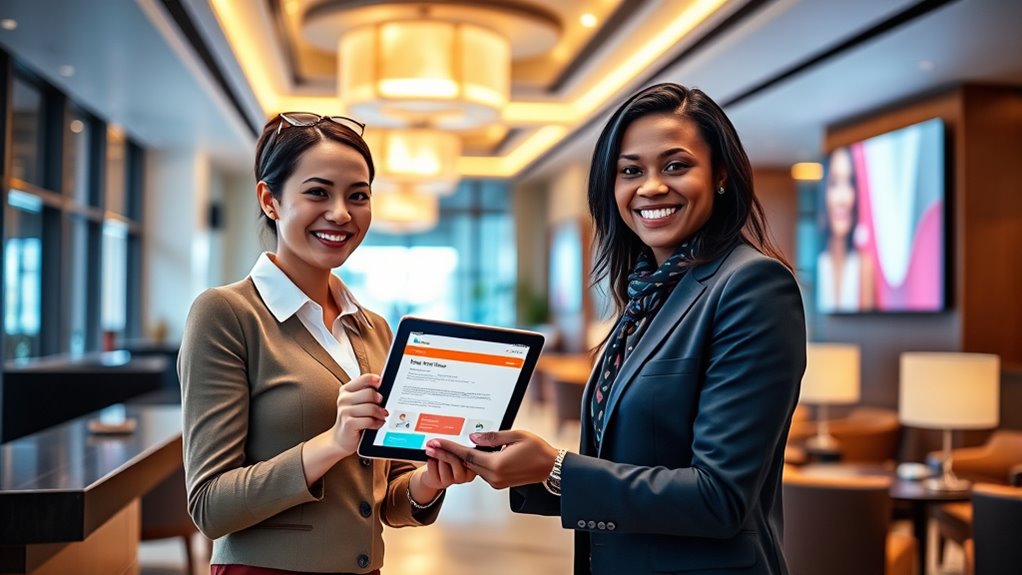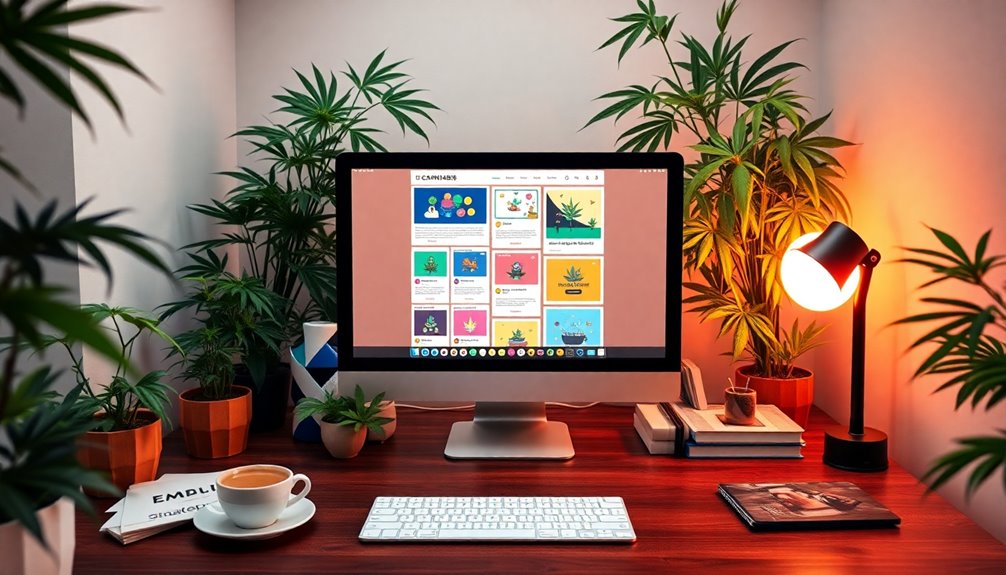Implementing dynamic, personalized emails allows you to proactively address guest needs and concerns, which markedly reduces cancellations. By customizing messages based on booking history, preferences, and real-time insights, you can send timely updates, reminders, and tailored offers that build trust and engagement. This approach not only reassures guests but also fosters loyalty. Continuing to explore these strategies shows you how to craft effective campaigns that keep travelers committed to their bookings, even before they arrive.
Key Takeaways
- Use real-time analytics to personalize content and address guest concerns proactively, reducing cancellations.
- Schedule automated, timely notifications with relevant updates to keep guests engaged without overload.
- Incorporate dynamic content based on customer behavior and preferences to enhance relevance and trust.
- Utilize predictive analytics to identify potential issues early and offer tailored solutions preemptively.
- Collect and analyze guest feedback to refine email strategies, boosting satisfaction and loyalty.
The Impact of Personalized Communication on Traveler Satisfaction
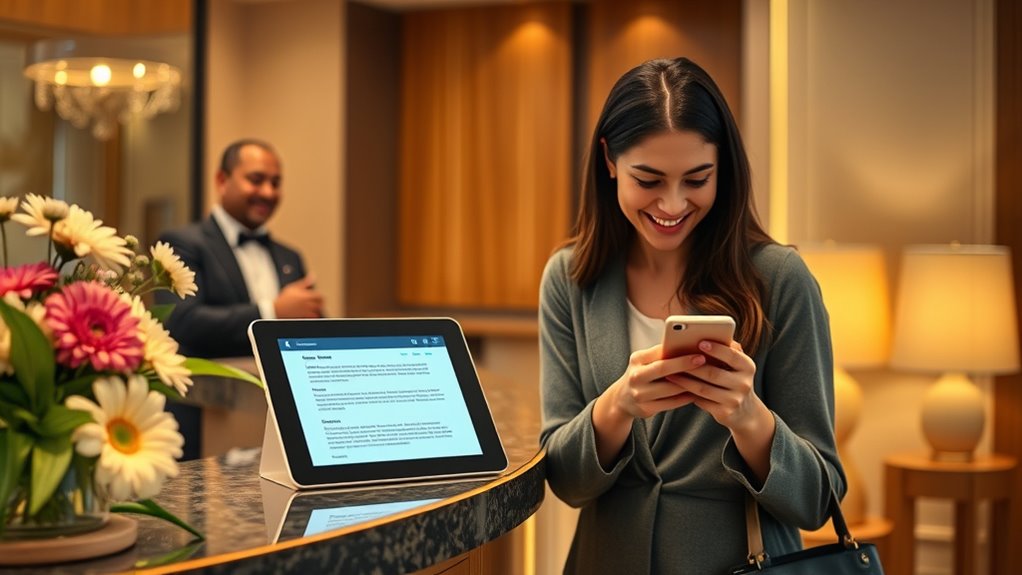
Personalized communication plays a crucial role in shaping traveler satisfaction by making guests feel valued and understood. When you prioritize guest personalization, you demonstrate that you care about individual preferences, which boosts customer engagement. Personalized messages, tailored offers, and customized experiences show travelers that their needs matter. This approach helps create a stronger emotional connection, encouraging loyalty and positive reviews. By addressing guests by name, referencing past stays, or suggesting relevant activities, you enhance their overall experience. Effective guest personalization not only elevates satisfaction but also reduces the likelihood of cancellations, as travelers feel more confident and appreciated. Additionally, adopting mindful decluttering strategies when managing guest information can streamline communication efforts and ensure that messages are relevant and well-organized. In today’s competitive hospitality industry, personalized communication is essential for building trust and ensuring guests return.
Leveraging Data to Craft Relevant and Timely Email Content
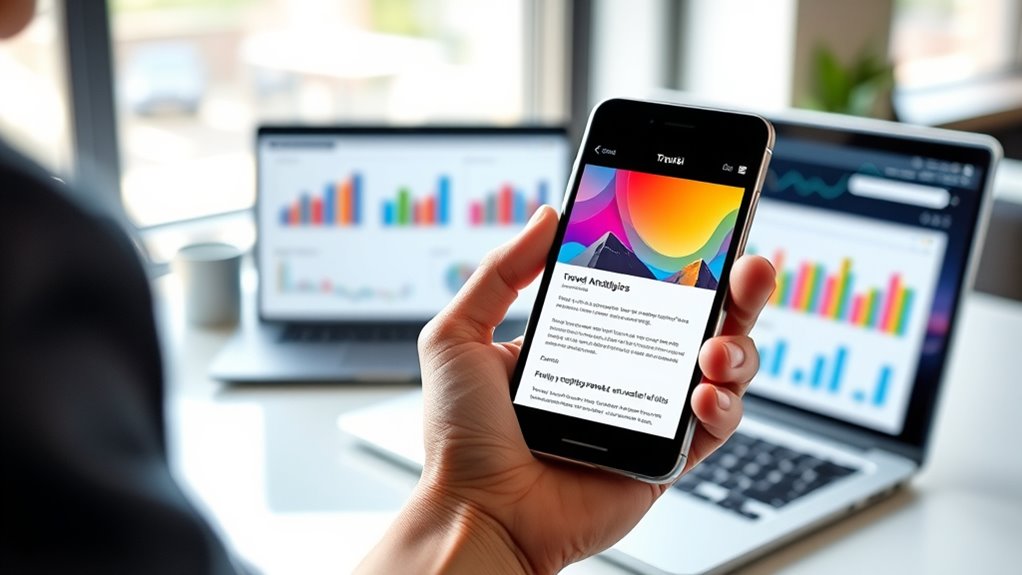
By harnessing the power of data, you can create email content that resonates with your travelers at the right moment. AI-driven personalization enables you to tailor messages based on individual preferences, booking history, and behavior, ensuring relevance. Real-time analytics provide immediate insights into traveler actions, allowing you to adjust your messaging dynamically. For example, if a traveler shows interest in a specific destination or activity, you can send targeted offers or updates precisely when they’re most receptive. Additionally, understanding projector technology helps you craft visual content that aligns with travelers’ interests in entertainment options. By integrating these data-driven tools, your emails become more timely and personalized, reducing the likelihood of cancellations. Ultimately, leveraging data helps you craft meaningful content that builds trust, enhances engagement, and encourages travelers to stay committed to their plans.
Strategies for Sending Proactive Updates and Reminders
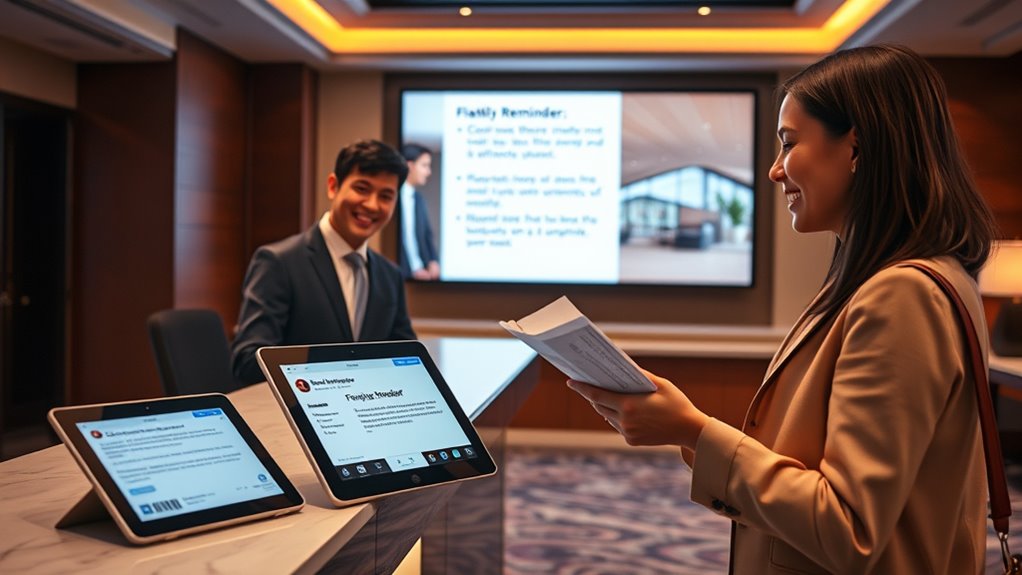
To keep your guests informed and engaged, you need to send updates and reminders at the right moments. Personalizing these messages makes them more relevant, encouraging prompt action. Make sure your notifications are clear and actionable to improve response rates and guest satisfaction. Incorporating best practices for message timing and content can further enhance guest experience and reduce cancellations.
Timely Notification Scheduling
Effective notification scheduling is essential for providing timely updates and reminders that enhance guest experience. By strategically planning when to send messages, you ensure guests receive relevant information without feeling overwhelmed. For example, sending booking incentives or loyalty program reminders a few days before check-in can motivate guests to confirm their plans or upgrade their stay. Additionally, timely notifications about upcoming deadlines or changes in reservation details help reduce last-minute cancellations. Use automated systems to schedule these updates based on guest behavior and booking timelines. Consistent, well-timed messages build trust and encourage engagement, making guests feel valued and informed. Proper scheduling not only improves communication but also increases the likelihood of guest satisfaction and loyalty.
Personalization for Engagement
How can you make your updates and reminders more engaging? Personalization is key. Use data from loyalty programs to tailor messages that resonate personally, increasing response rates. Incorporate brand storytelling to create a memorable experience that fosters loyalty. Here’s how to structure your proactive emails:
| Strategy | Example | Impact |
|---|---|---|
| Use customer data | Name & preferences | Builds connection |
| Highlight loyalty perks | Exclusive offers | Boosts engagement |
| Share brand stories | Local experiences | Creates emotional ties |
| Send timely reminders | Check-in alerts | Reduces cancellations |
| Personalize content | Custom itineraries | Enhances customer loyalty |
Clear, Actionable Content
Personalization makes your updates and reminders more meaningful, but their success also depends on how clearly and actionably you communicate. To guarantee your messages are effective, focus on clarity and simplicity. Use straightforward language, avoid jargon, and include specific instructions to guide recipients. Incorporate cultural sensitivity and multilingual communication by tailoring your content to diverse audiences, respecting language preferences, and avoiding idioms that may not translate well. To make your updates action-oriented, consider:
- Highlighting key dates and deadlines prominently
- Including clear call-to-action buttons or links
- Providing contact information for quick support
This approach helps reduce confusion, encourages engagement, and minimizes cancellations across varied customer groups.
Using Dynamic Content to Address Customer Concerns Before They Escalate

When you proactively address customer concerns using dynamic content, you can prevent issues from escalating and enhance their overall experience. Preemptive outreach allows you to anticipate customer needs and respond before problems arise. By analyzing customer data, you can identify potential concerns related to booking, accommodations, or travel plans. Then, tailor your emails to offer relevant solutions, reassurance, or updates based on their specific situation. This approach shows you understand their expectations and are committed to resolving issues early. Dynamic content enables you to customize messages in real-time, addressing customer anticipation effectively. Additionally, leveraging predictive analytics can help forecast potential issues before they occur. As a result, you build trust, reduce cancellations, and foster loyalty by demonstrating proactive care that keeps concerns from growing into larger problems.
Enhancing Post-Booking Engagement to Reduce Cancellations
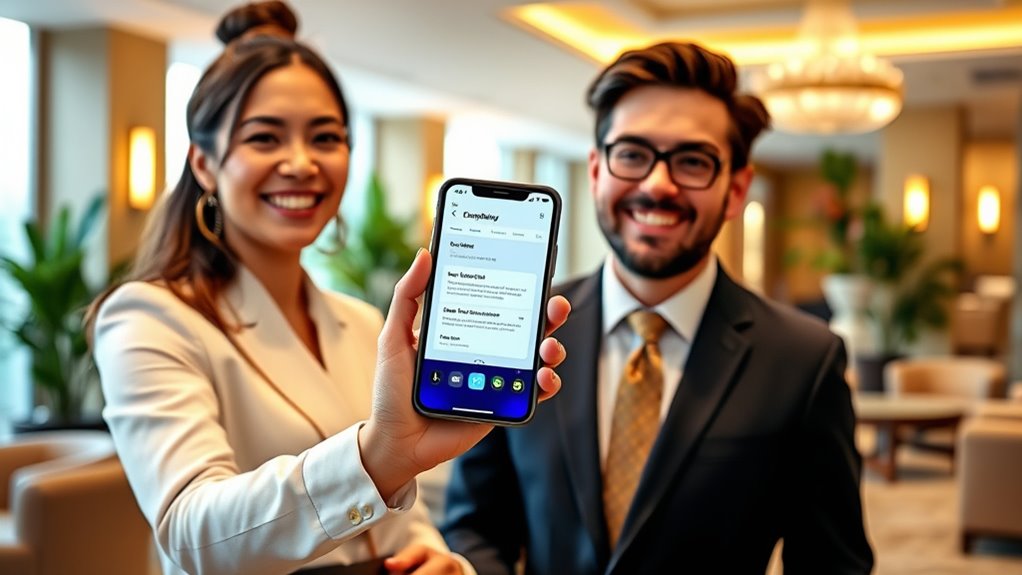
Once your guests complete their booking, engaging them promptly can make all the difference. Sending timely confirmation reminders, personalized stay tips, and exclusive post-stay offers encourages loyalty and reduces cancellations. These strategies keep guests connected and excited about their upcoming stay. Recognizing dream symbols associated with travel can also provide insights into guest emotions and expectations, enhancing your engagement approach.
Timely Confirmation Reminders
Timely confirmation reminders play a crucial role in maintaining guest engagement after a booking is made. They reassure your guests, reducing anxiety and the chance of last-minute cancellations. When you send these reminders, include essential details like check-in times, cancellation policies, and options for travel insurance. Highlight loyalty programs to encourage repeat bookings and loyalty. To make these reminders effective, consider including:
- Clear instructions for confirmation or updates
- Incentives like discounts or perks
- Contact info for quick support
These touches help guests feel valued and confident. By reinforcing their reservation early, you minimize uncertainty and build trust. A well-timed, informative email keeps your guests engaged, ultimately lowering cancellation rates and increasing loyalty. Incorporating personalized messaging demonstrates your attention to individual guest needs, further reducing the likelihood of cancellations.
Personalized Stay Tips
Building on the importance of confirmation reminders, personalized stay tips can substantially boost guest engagement after booking. By leveraging travel personalization, you tailor recommendations based on your guest’s preferences, upcoming activities, and local interests. This targeted approach shows you care about their experience and helps them plan better. Sharing personalized suggestions—such as nearby attractions, dining options, or local events—keeps guests excited and engaged before their stay. It also encourages them to look forward to their trip, reducing the likelihood of cancellations. When your emails focus on relevant, personalized content, guest engagement naturally increases. This proactive communication demonstrates your attentiveness, fostering trust and loyalty while minimizing last-minute cancellations. Incorporating digital literacy into your communication strategies ensures guests feel confident and informed about their trip details. Personalized stay tips are a simple yet effective way to keep your guests connected and committed to their upcoming visit.
Exclusive Post-Stay Offers
Offering exclusive post-stay offers is a powerful way to keep guests engaged after their visit and encourage future bookings. By providing special discounts, tailored loyalty programs, or early access to promotions, you reinforce their positive experience. To maximize engagement, consider integrating social media channels, allowing guests to share their stays and receive personalized offers. This social media integration not only boosts your visibility but also fosters a sense of community. Use these strategies to deepen guest loyalty and reduce cancellations:
- Send personalized follow-up emails with exclusive offers
- Promote loyalty programs that reward repeat stays
- Encourage social sharing by offering incentives for posts or reviews
- Recognize the importance of Relationship-building in maintaining guest trust and satisfaction.
Integrating Feedback Loops for Continuous Email Optimization

To keep your email campaigns effective in the hospitality and travel industry, integrating feedback loops is essential. These loops help you gather insights directly from guests, enabling you to refine your messaging and improve guest loyalty. By consistently analyzing responses, you can identify what resonates and adjust your emails accordingly. This ongoing process guarantees your loyalty programs stay relevant and engaging. Use the table below to understand key feedback methods:
| Feedback Method | Purpose |
|---|---|
| Surveys | Gather detailed guest preferences |
| Open & Click Rates | Measure engagement levels |
| Direct Replies | Address specific concerns or suggestions |
| Social Media Listening | Monitor guest sentiments outside emails |
Implementing these strategies leads to more personalized experiences, reducing cancellations and boosting guest loyalty. The use of feedback collection strategies can significantly enhance the effectiveness of your communication efforts.
Case Studies: Successful Implementation of Dynamic Email Campaigns
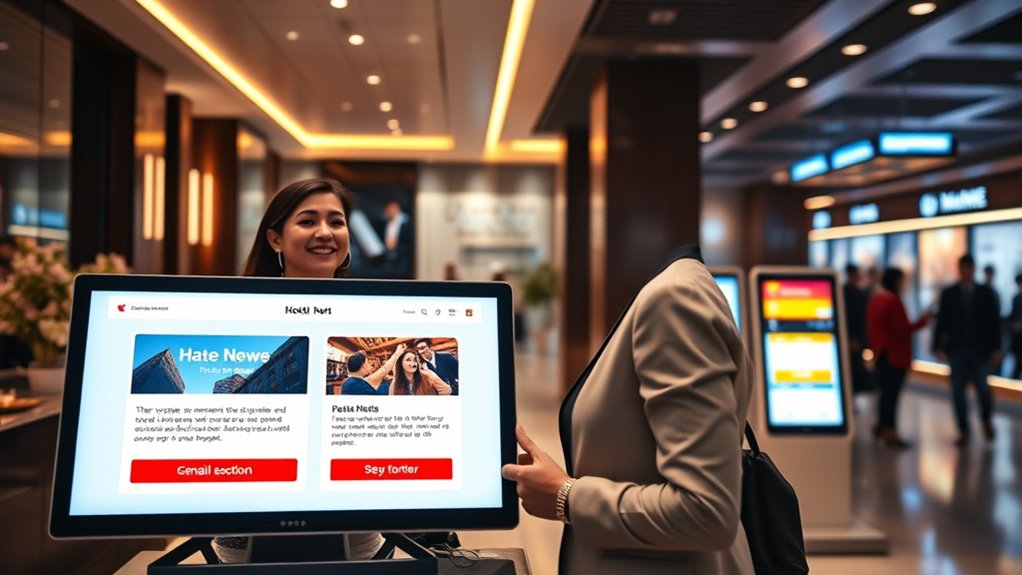
Real-world examples demonstrate how dynamic email campaigns can substantially boost guest engagement and loyalty in the hospitality and travel industry. One hotel chain personalized pre-arrival emails, addressing luggage restrictions and suggesting packing tips, reducing security delays. An airline used dynamic content to send tailored notifications about airport security procedures, helping travelers prepare and avoid last-minute stress. Another success involved a travel agency customizing offers based on trip details, including airport security regulations relevant to destinations. Integrating pinball mechanics into digital interfaces can enhance user interaction and engagement with these campaigns.
- Personalized packing lists based on luggage restrictions
- Timely updates about airport security procedures
- Customized offers aligned with travelers’ specific itineraries
These campaigns not only improve the guest experience but also lower cancellations by proactively addressing common travel concerns.
Best Practices for Segmenting Audiences and Tailoring Messages

Effective audience segmentation and message tailoring build on successful email campaigns by ensuring your communications resonate with specific traveler groups. Guest segmentation allows you to categorize travelers based on preferences, booking behavior, or demographics, enabling more relevant messaging. Personalizing your messages makes guests feel valued and understood, increasing engagement and reducing cancellations. Use data to identify distinct segments such as business travelers, families, or adventure seekers. Then, craft targeted offers or information for each group. Here’s a simple way to visualize your segments:
| Segment Type | Key Attribute | Example Message |
|---|---|---|
| Business Travelers | Time-sensitive, frequent | “Exclusive upgrade for your next trip” |
| Families | Travel with kids | “Fun activities for all ages” |
| Adventure Seekers | Thrill and exploration | “Explore new destinations today” |
| Luxury Guests | High-end preferences | “Premium suite waiting for you” |
Measuring the Effectiveness of Dynamic Emails in Hospitality and Travel

Measuring the success of dynamic emails in hospitality and travel requires tracking how well personalized content resonates with your audience. Focus on key metrics like open rate to assess engagement and adjust your email frequency accordingly. A higher open rate indicates your messages are relevant and timely, reducing cancellations. To evaluate effectiveness, consider these aspects:
- Monitor changes in email frequency to avoid overwhelming recipients
- Analyze open rate trends over time for consistent improvement
- Segment data to see which personalized content drives the most engagement
Frequently Asked Questions
How Do Dynamic Emails Influence Customer Loyalty in Hospitality?
Dynamic emails boost customer loyalty by delivering guest personalization, making each message relevant and engaging. When you tailor content based on guest preferences and behaviors, it fosters a stronger connection and encourages repeat bookings. Incorporating loyalty programs into these emails rewards guests for their loyalty, motivating them to choose you again. This targeted approach not only reduces cancellations but also builds long-term relationships, ensuring guests feel valued and understood.
What Privacy Considerations Are Essential When Personalizing Travel Emails?
Ever wonder if your travel emails are spying on you? When personalizing, you must respect data privacy and personalization ethics, or risk crossing the line. Use only necessary data, be transparent about how you use it, and give customers control. This way, you build trust, avoid privacy pitfalls, and keep your audience enthusiastic for your tailored offers—without feeling like Big Brother is watching.
How Can Automation Improve the Timing of Travel-Related Email Campaigns?
You can enhance your email campaigns by focusing on personalization timing and email scheduling. Automation allows you to send messages at ideal moments based on customer behavior, ensuring your emails arrive when recipients are most likely to engage. By leveraging automation, you improve the relevance and effectiveness of your travel-related emails, reducing cancellations and increasing bookings. Proper timing and scheduling make your communication more personalized and impactful, fostering better customer relationships.
What Are Common Challenges in Implementing Dynamic Email Strategies?
Ever wonder why some dynamic email strategies stumble? You might face challenges like data integration issues, making it hard to gather and sync customer info seamlessly. Content personalization becomes tricky if your data isn’t unified, leading to generic messages that don’t resonate. These hurdles can slow down implementation and reduce effectiveness. To succeed, you need to streamline data sources and focus on personalized content to truly engage your audience.
How Do Dynamic Emails Impact Overall Booking Conversion Rates?
Dynamic emails markedly boost your booking conversion rates by leveraging personalization techniques and content customization. When you tailor messages to each recipient’s preferences and behaviors, you make your offers more relevant and engaging. This targeted approach encourages potential guests to complete their bookings, reducing hesitation and cancellations. Overall, implementing dynamic emails helps you create a seamless, personalized experience that drives higher conversion rates and increases your revenue.
Conclusion
By personalizing your emails with dynamic content, you create a seamless experience that builds trust and reduces cancellations. For example, a hotel chain that sends tailored pre-arrival tips and real-time updates observed a 20% drop in last-minute cancellations. Continuously optimizing your messaging through feedback and data guarantees you stay ahead of traveler needs. Embrace these strategies to boost satisfaction and keep travelers engaged from booking to post-stay.
